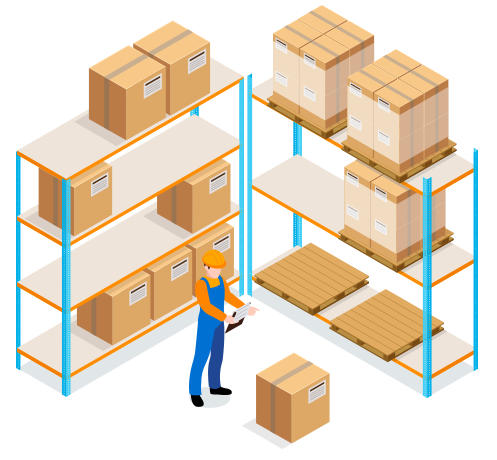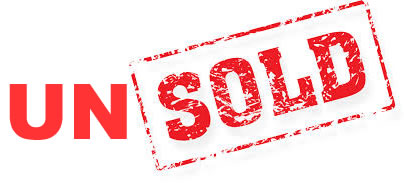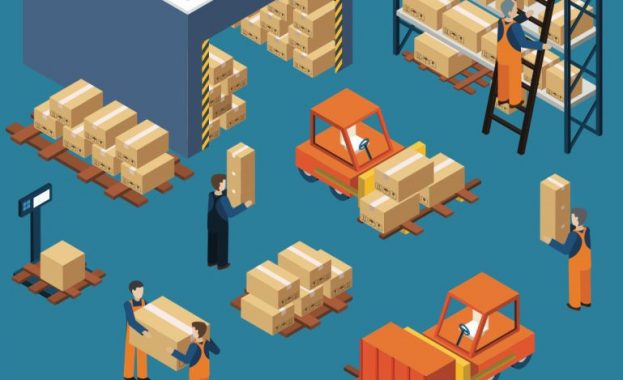The Retailer’s Guide to Inventory Management
If you’re an online reseller, then keeping track and managing your inventory is crucial to the success of your online store. How can you accurately gauge your success and growth if you don’t know what you have in stock or what’s selling well? Besides, most of your success in retail is based on making the right decisions, and making the right decisions requires you to have accurate information. This is where inventory management comes in.
What Is Inventory Management?

Inventory management is a crucial part of supply chain management that ensures you always have the right products in the right quantity for sale at any given time. If done right, your e-commerce store can reduce the costs of carrying excess inventory while maximizing sales. Good inventory management can help you track your inventory in real time to streamline this process.
By effectively managing your inventory you can have the right products in the right quantity on hand and avoid products being out of stock and funds being tied up in excess stock. You can also ensure your products are sold in time to avoid spoilage, or spending too much money on stock that’s taking up space in a warehouse or stockroom.
Does Inventory Management Apply to A Dropshipping Store?
If you’re an e-commerce store owner, just remember that there is more than one retail fulfillment model that you can follow. In fact, there are a few ways that you can sell online without using any inventory, including dropshipping. With dropshipping, the online reseller does not actually handle any of the inventory. Instead, their dropshipping supplier handles the storing, packing, and shipping of products to the final customer.
In this case, inventory management does not really fall under the online retailer’s responsibility. The dropshipping supplier handles these logistics, so it’s important that the online reseller chooses a supplier that has excellent inventory management. For instance, if you think a product is in stock and an online shopper makes a purchase from your store only to find that the supplier is out of stock, then the online shopper will still blame you. In their eyes, they don’t really want to know “how the sausage gets made”, so to speak. They just expect to make the purchase and have the products arrive on time.
On the other hand, if you’re buying products in bulk for resale, then best inventory management practices will be absolutely necessary for you. Remember, you’ll be responsible for storing, packing, and shipping the items. Essentially, you’ll be running a fulfillment center (in addition to your online store), whether it’s out of your garage or in warehouse space that you’ve rented. If you’re selling perishables or food items, then it’s extra important. You need to make sure that these items aren’t expired or that they arrive fresh and ready-to-consume for your customers.
What Are The Main Challenges in Inventory Management?

Any e-commerce store owner knows that there can be real hassles when dealing with inventory management. In fact, just keeping track of inventory is a headache, so actively managing it can be a real challenge. That being said, let’s take a look at the most common problems in inventory management. All of these refer to both conventional, brick-and-mortar retail operations as well as e-commerce stores:
1. Overstocking and Understocking

This is every online retailer’s worst nightmare – you thought a certain product was going to sell well. So you go ahead and stock up, spending lots of money to buy in bulk at wholesale prices. And then the worst-case scenario strikes: you’re not selling the products! Now you have a surplus of unsold goods and there’s no money coming in.
Overstocking means you have precious capital tied up in inventory just sitting in your storage space. This lost revenue eats up your precious budget for marketing and running your store. You may never be able to sell these products and demand may evaporate entirely, leaving you with a money suck that affects your entire store’s profitability and viability.
On the flip-side, under-stocking is just as bad. On that end, while you free up capital, you run the risk of losing sales due to not having anything to sell. This can also hurt your reputation—if you end up refunding an online shopper’s money because you made a sale and were then not able to fill the order, then not only will they not come back, but they may even be vocal about their disapproval.
2. Losing Stock and Having Incorrect Inventory Levels
Internal audits are an important part of inventory management for your e-commerce store. They allow you to properly keep track of what you’ve sold precisely so you can avoid the problems of over- or under-stocking.
However, have you ever done an inventory audit only to find that your system says you have five items in stock when in reality you only have three? This lost stock can lead to canceled or back-ordered purchases, which again can affect your reputation and cost you money.
3. Not Using An Accurate or Centralized Inventory Management System
Some online resellers use inaccurate “systems” (if they use any at all) for inventory management. Some will even keep track of purchases on pen and paper – this is just a recipe for disaster!
So it may be necessary to invest in a proper software suite or management system. A centralized inventory management system can solve all of the above problems. You should always be able to quickly and accurately know how much inventory you have at any given time. This is absolutely crucial for your online store’s success.
How to Manage your Online Store’s Inventory?
While you run your online store, you may run into some of the problems we listed above. Proper inventory management can help you avoid them, so make sure that you:
- Reduce your costs and improve cash flow – You need to always try and boost your online store’s bottom line.
- Keep accurate track of your inventory in real time – You need to always know what and how much you have.
- Use an inventory management system to forecast and predict demand – If you see an item is selling especially well, then you can try to capitalize on that emerging trend and secure it in bulk from your wholesaler.
- Avoid under-stocking – If you have to refund an order to an online shopper, then it’s almost certain that they’ll be unhappy with your service.
- Don’t overstock – If you end up with unsold surplus, that’ll be coming out of your pocket and operational budget!
- Organize inventory in your warehouse or storage space – This is especially important if you’ve had to hire workers in your home-based fulfillment center.
- Use “multi-location management” – This means you can track inventory across several locations or storage spaces.
Remember, this applies only if you’re buying products in bulk for resale. If you’re still running a dropshipping store, then inventory management is not something that you’ll be responsible for.
Why Is Dropshipping the Easiest Way to Manage Inventory?
The dropshipping retail model means that the online retailer does not actually handle the inventory management. The dropshipping supplier handles the logistics of storing, packing, and shipping items. If you’re just starting and are looking to avoid the costs of managing inventory, then dropshipping is an excellent choice. For instance, if you decide to dropship food items, then your supplier will oversee the complicated storage of these perishable goods.
Let’s consider for a second that many dropshipping suppliers also function as wholesalers. This gives you a retail strategy to minimize risk and maximize profit: you could test out new products via dropshipping. If they sell well, then you can contact your supplier and buy products in bulk. Of course, this means that you’ll have to secure a storage space since you will essentially be running a fulfillment center and an online store.
For instance, GreenDropShip is a supplier that offers both dropshipping services and the ability to buy in bulk. We have an inventory of over 20,000 natural and organic items to choose from. Additionally, most of these goods are made in the USA. If you’re an online reseller looking for profitable products, then you can try dropshipping first and then buy them in bulk.
How to Manage Inventory If You’re Buying In Bulk
If you’ve decided to buy items in bulk, then you’ll be responsible for inventory management. So let’s go over some simple tips:
- Choose a narrow niche – If you’re storing your own inventory, then you probably won’t have much space. For example, GreenDropShip has 20,000 items and we require large-scale warehouses to store them all. Focusing on a niche will allow you to store fewer goods.
- Determine if you need a climate-controlled environment – Selling groceries online is a smart move nowadays and there are plenty of great wholesale grocery distributors to choose from. However, many of these goods are perishable, so you’ll need to invest in a climate-controlled storage space.
- Have a system for expiration dates – If you’re selling perishables, you’ll also need to make sure that they reach your customers fresh.
- Doublecheck storage best practices for other products – Food and beverage are not the only items that are sensitive to temperature. For instance, beauty products or oil-based items (like essential oils) can also be sensitive to temperature and direct sunlight.
- Invest in an inventory management system – You should avoid using outdated systems or relying on simple pen and paper. This is especially true if your store becomes more successful and you need to scale up. For instance, if you have to hire help to allow you to fulfill orders in a timely manner, then you’ll need to have a centralized system for inventory management.
It’s important to remember that dropshipping buying products in bulk requires proper inventory management.
Choosing the Right Supplier Can Make All the Difference

If inventory management is too much for you to handle, or you don’t have enough resources, then you can choose the dropshipping model. Of course, GreenDropShip is first and foremost a dropshipping supplier for our members. We’ll be handling the inventory management and you can focus on marketing and customer service. Think of it like a collaboration, where we split the workload and focus on our respective strengths.
If you think you can handle it, however, then you can always buy products in bulk from us and store them yourself. We have over 20,000 natural and organic products at competitive wholesale prices. We specialize in groceries, aromatherapy, beauty products, body care, and health products. Contact our team today and become a member!









